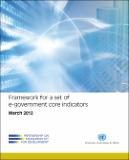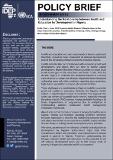Strengthening the capacities of selected African countries to develop geospatial information resources and services in support of the implementation and monitoring of the Sustainable Development Goals : note by the Secretariat

View
Download
Published
2020-09Author(s)/Corporate Author (s)
United Nations. Economic Commission for Africa;United Nations. Economic and Social Council;
United Nations. Economic Commission for Africa;
United Nations. Economic and Social Council;
Metadata
Show full item recordAbstract
The 2030 Agenda for Sustainable Development requires quality, accessible, timely and reliable disaggregated data for measuring, monitoring and reporting on the 17 Sustainable Development Goals. Geospatial information was identified as an important data set for them and this study assessed the need for such information. The assessment was conducted at the level of the indicators of the Sustainable Development Goals and found that 126 (51.4%) of the indicators require geospatial information, and that some such information is required for all 17 Goals. The geospatial information has been organized into geospatial feature classes using the global fundamental geospatial data themes. For semantic reasons it is important to provide a geospatial data taxonomy for these geospatial feature classes. The geospatial data taxonomy describes the geospatial feature class, its logical data model, the collection and maintenance of the features and their use in the indicators of the Sustainable Development Goals. The geospatial information must comply with the relevant standards. To make the geospatial information discoverable and to provide information on its fitness for use, including any access restriction, the geospatial information must have complete metadata, preferably at least at the level of the data sets. This study furthers the work of the African Action Plan on Geospatial Information for Sustainable Development
Citation
“United Nations. Economic Commission for Africa; United Nations. Economic and Social Council; United Nations. Economic Commission for Africa; United Nations. Economic and Social Council (2020-09). Strengthening the capacities of selected African countries to develop geospatial information resources and services in support of the implementation and monitoring of the Sustainable Development Goals : note by the Secretariat. UN. ECA Regional Committee of United Nations Global Geospatial Information Management for Africa Meeting (6th :2020, Nov. 24 - 26 : Addis Ababa, Ethiopia). Addis Ababa :. © UN. ECA,. https://hdl.handle.net/10855/47894”Conference
UN. ECA Regional Committee of United Nations Global Geospatial Information Management for Africa Meeting (6th :2020, Nov. 24 - 26 : Addis Ababa, Ethiopia)Collections
Related items
Showing items related by title, author, creator and subject.
Framework for a set of e-government core indicators
United Nations Conference on Trade and Development; United Nations. Economic Commission for Africa.; United Nations. Economic Commission for Latin America and the Caribbean; United Nations. Economic and Social Commission for Asia and the Pacific; United Nations. Economic and Social Commission for Western Asia; Statistical Office of the European Union; International Telecommunication Union; Organisation for Economic Co-operation and Development; United Nations Conference on Trade and Development
“United Nations Conference on Trade and Development; United Nations. Economic Commission for Africa.; United Nations. Economic Commission for Latin America and the Caribbean; United Nations. Economic and Social Commission for Asia and the Pacific; United Nations. Economic and Social Commission for Western Asia; Statistical Office of the European Union; International Telecommunication Union; Organisation for Economic Co-operation and Development; United Nations Conference on Trade and Development (2012). Framework for a set of e-government core indicators. Addis Ababa :. © UN. ECA,. https://hdl.handle.net/10855/25669”
Understanding the Relationship between Health and Education for Development in Nigeria
United Nations. Economic Commission for Africa; United Nations. Economic Commission for Africa. African Institute for Economic Development and Planning(IDEP); United Nations. Economic Commission for Africa; United Nations. Economic Commission for Africa. African Institute for Economic Development and Planning(IDEP)
“Kalu, Chris U.; Abdul-Raheem, Tajudeen; United Nations. Economic Commission for Africa; United Nations. Economic Commission for Africa. African Institute for Economic Development and Planning(IDEP); United Nations. Economic Commission for Africa; United Nations. Economic Commission for Africa. African Institute for Economic Development and Planning(IDEP) (2018-05). Understanding the Relationship between Health and Education for Development in Nigeria. Policy Brief. No. 007, 4 p.: ill.. Addis Ababa:. © UN. ECA,. https://hdl.handle.net/10855/49836”
Report of a mission to a brainstorming session on the preparation for women's meeting and mainstreaming of gender in the process of the international conference on the great lake Nairobi, Kenya, 16 February 2004
United Nations. Economic Commission for Africa. African Centre for Gender and Development; United Nations. Economic and Social Council; United Nations. Economic Commission for Africa. African Centre for Gender and Development; United Nations. Economic Commission for Africa.; United Nations. Economic and Social Council
“Tiagha, Hannah; United Nations. Economic Commission for Africa. African Centre for Gender and Development; United Nations. Economic and Social Council; United Nations. Economic Commission for Africa. African Centre for Gender and Development; United Nations. Economic Commission for Africa.; United Nations. Economic and Social Council (2004). Report of a mission to a brainstorming session on the preparation for women's meeting and mainstreaming of gender in the process of the international conference on the great lake Nairobi, Kenya, 16 February 2004. Addis Ababa :. © UN. ECA,. https://hdl.handle.net/10855/40625”



